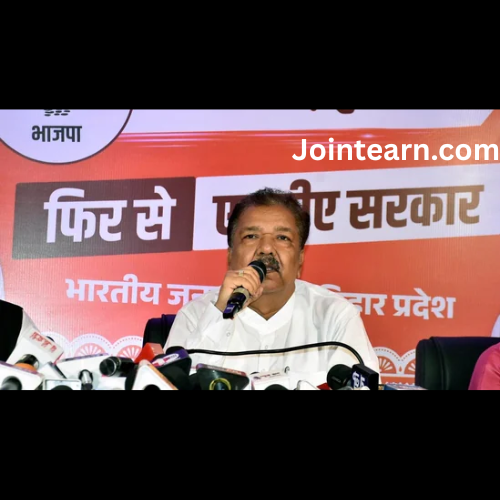
Bihar Bharatiya Janata Party (BJP) president Dilip Jaiswal on Sunday launched a sharp attack on the opposition Rashtriya Janata Dal (RJD), accusing the party of making “empty promises” and dismissing its statements as inconsequential ahead of the 2025 Bihar Assembly elections. His comments followed claims by RJD leader Qari Sohaib that the party’s Chief Ministerial candidate, Tejashwi Yadav, would “scrap the Waqf law” if elected to lead Bihar.
Speaking to ANI, Jaiswal emphasized that the people of Bihar are wary of promise-makers, stating, “Whatever RJD says holds no importance. These (RJD and Congress) are people who deal in empty promises. The people of Bihar do not trust such promise-mongers.” He framed the BJP-led National Democratic Alliance’s (NDA) governance under Chief Minister Nitish Kumar and Prime Minister Narendra Modi as a foundation for a “developed Bihar,” suggesting that ongoing projects and reforms were evidence of steady progress in the state.
“He (Home Minister Amit Shah) clearly stated that under the rule of Nitish Kumar and Prime Minister Modi, Bihar’s structure is being built from the foundation to the top. Today, Bihar is moving towards a developed Bihar,” Jaiswal added, asserting that the state is witnessing growth and development under the current leadership.
Earlier, BJP MP Dinesh Sharma expressed strong confidence that the NDA would secure more than a two-thirds majority in the upcoming assembly elections. He claimed that the opposition Mahagathbandhan, which includes the RJD, Congress, and other smaller parties, would fail to achieve even a three-digit seat count. “We are going to secure more than a two-thirds majority, and even if Congress, RJD, AIMIM, and potentially SP support them, they are unlikely to win three-digit seat counts collectively,” Sharma said on Saturday.
Sharma had also previously taken a dig at Tejashwi Yadav following his announcement as the Mahagathbandhan’s Chief Ministerial candidate. “Tejashwi Yadav’s happiness over the announcement is for a limited time, as I believe Congress and its allies won’t achieve a majority. They can’t reach triple digits,” he remarked, suggesting that the opposition’s momentum may be short-lived.
The Bihar Assembly elections, slated to be held in two phases on November 6 and 11, are expected to witness a direct contest between the NDA and the Mahagathbandhan. The NDA, apart from the BJP, includes the Janata Dal (United), Lok Janshakti Party (Ram Vilas), Hindustani Awam Morcha (Secular), and Rashtriya Lok Morcha. On the other hand, the Mahagathbandhan is led by the RJD and includes Congress, the Communist Party of India (Marxist-Leninist) Liberation led by Dipankar Bhattacharya, the Communist Party of India (CPI), the Communist Party of India (Marxist), and Mukesh Sahani’s Vikassheel Insaan Party (VIP).
Adding to the competitive landscape, Prashant Kishor’s Jan Suraaj Party has declared that it will contest all 243 assembly seats in Bihar, introducing another variable in the electoral dynamics. The counting of votes is scheduled for November 14, which will decide the next government of Bihar.
Jaiswal’s statements come against the backdrop of a broader campaign narrative by the BJP and its allies emphasizing development, governance, and continuity. By highlighting alleged “empty promises” by the opposition, the party aims to position itself as a reliable and stable choice for the electorate, contrasting its governance record with the perceived unfulfilled commitments of the Mahagathbandhan.
The issue of the Waqf law, raised by RJD’s Qari Sohaib, became a focal point for the BJP’s criticism, with Jaiswal framing the claim as an example of the opposition’s penchant for making controversial and populist promises. The remarks underscore the sensitive nature of religious and legal issues in electoral politics and how parties seek to leverage them to consolidate voter bases.
With the elections just weeks away, both the NDA and the Mahagathbandhan are intensifying their campaigns. While the opposition is projecting Tejashwi Yadav as a symbol of change and promising reforms to garner widespread support, the BJP is emphasizing continuity and development under its current leadership, portraying itself as the party of progress and stability.
Analysts note that Bihar’s electoral politics have historically been influenced by caste, community alignments, and governance narratives. The current campaign demonstrates a continuation of these trends, with parties seeking to mobilize their core supporters while also appealing to broader development and governance concerns.
In the coming weeks, both the NDA and the Mahagathbandhan are expected to intensify outreach efforts across the state, including public rallies, community engagements, and targeted messaging through traditional and social media platforms. The stakes are high, as Bihar represents a significant political battleground with implications for both state-level governance and national political equations.
Ultimately, the outcome of the 2025 Bihar Assembly elections will depend on the electorate’s assessment of past governance, promises for future development, and the effectiveness of each party’s campaign strategies. With the NDA positioning itself as a stable, development-focused alliance and the Mahagathbandhan highlighting promises of reform and change, the electoral contest is poised to be closely watched both within Bihar and nationally.


Leave a Reply